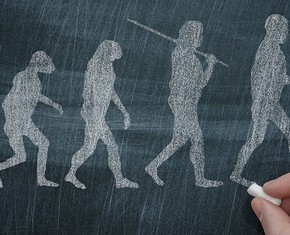The views expressed in our content reflect individual perspectives and do not represent the authoritative views of the Baha'i Faith.
In these essays on the Intelligence Squared debate on “Science Refutes God,” I have concentrated mostly on the motion proposed by Team Atheist (writer Michael Shermer and physicist Lawrence Krauss), because I felt so many of their propositions went unanswered by Team Believer (political commentator Dinesh D’Souza and physicist Ian Hutchinson). I did, however, appreciate a number of points Team B made in the course of the debate.
I offer Dinesh D’Souza’s response to the question of faith:
…you ask if [faith is] scientific, and I would say no. Faith is not scientific. But faith is completely rational. Why? Because where empirical evidence can’t go, it’s not unreasonable to believe on faith. Let’s say, for example, you’re making any kind of a decision … whether to propose marriage. You bring in all the evidence you can. And yet if you’re asking the question … what will life be like with this woman over the next thirty years? You’re never going to have a full answer. Now, you can say, “I’ll be an agnostic and wait for the data to come in.” But the data will never come in. She’ll marry someone else, and you’ll both be dead. So you put in all the knowledge you can, and the leap of faith is a completely rational bridge from knowledge to action.
I appreciate how pragmatic D’Souza’s example is and, while I would disagree with him that faith is unscientific, I completely agree that it is rational. I disagree that it’s unscientific because the model of faith suggested by the sacred texts of all religions recommends the principles of the scientific process—hypothesize/imagine, test/observe, assess, reflect/meditate, and adjust accordingly.
As Christians, D’Souza and Hutchinson no doubt understood these principles, but didn’t mention them in the debate. After all, Christ promotes observation and rationality as a means of testing reality when he asks his followers to use reason in the process of distinguishing truth from falsehood. This is but one Biblical passage in which Christ endorses the practice of observation and reason:
Beware of false prophets, who come to you in sheep’s clothing, but inwardly they are ravenous wolves. You will know them by their fruits. Do men gather grapes from thornbushes or figs from thistles? Even so, every good tree bears good fruit, but a bad tree bears bad fruit. A good tree cannot bear bad fruit, nor can a bad tree bear good fruit. – Matthew 7: 15-18
The Baha’i writings speak more directly about reason and science. Of course they have the benefit of modern language better-suited to describe the scientific concepts:
God has created man and endowed him with the power of reason whereby he may arrive at valid conclusions. Therefore, man must endeavor in all things to investigate the fundamental reality. If he does not independently investigate, he has failed to utilize the talent God has bestowed upon him. – Abdu’l-Baha, The Promulgation of Universal Peace, p. 313.
D’Souza’s point about the necessity of acting on faith is well taken: We are often called upon to act in the absence of empirical data or foreknowledge of the results (fruits) of a decision. If we wait for certitude based on empirical facts, we fail to act. Buddha gives a marvelous allegory about this, involving a man who’s shot by a poisoned arrow and insists on knowing everything about the arrow, the poison, and the shooter before he will allow the physician to heal him. Buddha’s very rational conclusion: “Well, that man would die. But he would die without knowing any of these things.”
It seems obvious that we do not progress without the faith to act. The scientific process itself would be hamstrung if scientists eschewed both intuition and rational inference. Some of the most important scientific statements are not facts, but rationally inferred “truths.” Take E=mc2, for example—the fruit of Albert Einstein’s work in relativity. It is a far more important statement, scientifically, than “snow is white,” but it is an inferred statement, not one that can be directly observed through the senses.
Team Atheist failed to acknowledge that, even within the realm of science, there is more than one way to know or experience things. This perpetuates the bizarre myth that science is only an encyclopedia of facts provable under controlled conditions, and that it can prove everything worth proving.
No less a scientist than Einstein understood that science is a human process, not a collection of facts about physical things:
When I examine myself and my methods of thought, I come close to the conclusion that the gift of imagination has meant more to me than any talent for absorbing absolute knowledge. …All great achievements of science must start from intuitive knowledge. I believe in intuition and inspiration…. At times I feel certain I am right while not knowing the reason. – Calaprice, 2000, 22, 287, 10.
Einstein’s thoughts on imagination, intuition, and inspiration are echoed by Baha’i mathematician William S. Hatcher:
Scientific inquiry brings into play a host of human faculties such as reason, intuition, and experience, and these on different levels of profundity and objectivity. One cannot, however, explain in any simple manner the way in which these faculties interact to produce a given statement of science. The statements of science are arrived at by a process of repeated application of these human faculties, and by many different human beings. Years of experimentation (organized experience), theorizing (conscious reasoning and intuition), and discussion lie behind the one statement “e=mc2”.
It would be a mistake to say that we hold such a statement to be true because of reason, or because of intuition, or because of experience. In the final analysis, we hold something as true only because of everything else which we accept as true, that is, because this something is consistent with our experience and understanding of life as a whole. – William S. Hatcher, The Science of Religion, p. 12.
You May Also Like
Comments

















Thanks for sharing